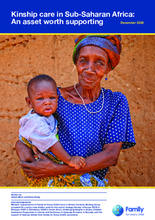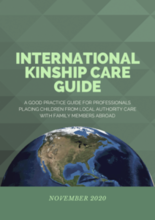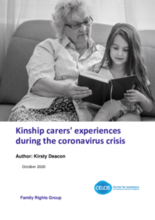Displaying 61 - 70 of 576
This paper argues that kinship care – the care of children by relatives or friends of the family – represents the greatest resource available for meeting the needs of girls and boys who are orphaned or otherwise live apart from their parents.
This paper explores how pediatricians can support families who care for children and adolescents who are fostered and adopted while attending to children’s medical needs and helping each child attain their developmental potential.
This guide is the first of its kind which comprehensively addresses the best practice for placing Looked After Children currently in the UK into the care of a family member(s) who lives in another country.
The present study aims to explore the associations between grandparenting styles and childhood depression, as well as the mediating role of childhood food insecurity on the focal associations among Chinese rural left-behind children.
Drawing on semi‐structured in‐depth interviews with 31 kinship caregivers, this study sought to explore how the culturally informed traditional kinship care practice in Ghana can be considered an intervention strategy for parental neglect.
This Australian research project explored the prevalence of kinship care households in Australia, with a particular focus on households headed by young kinship carers.
A survey was administered to develop a better understanding of the experiences of kinship care households in the UK as a result of the Coronavirus crisis, and what urgent steps could be taken by Government, local authorities and other agencies to help. This supplementary report provides an in-depth analysis of the kinship carers in Scotland and provides the legal context to influence national and local kinship care policies, practices and services of local authorities and other public agencies.
This article documents the author's experiences with the state’s contemporary removal of Aboriginal children in Western Australia (WA) and the practice of Aboriginal Family Led Decision Making (AFLDM), a family led decision making process supported as best practice for Aboriginal families.
The aim of this study was to explore the experiences of Victorian foster and kinship carers in accessing health services for children in their care and to quantify the frequency of potential barriers to health care.
This study examined how custodial grandmothers navigated the process of their grandchildren being reunified with a biological parent.



